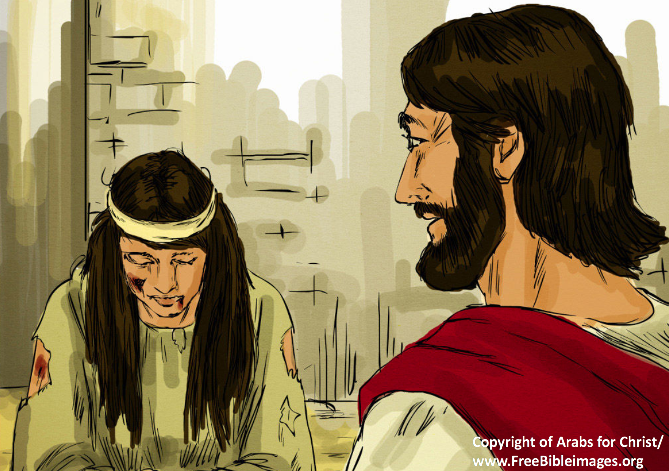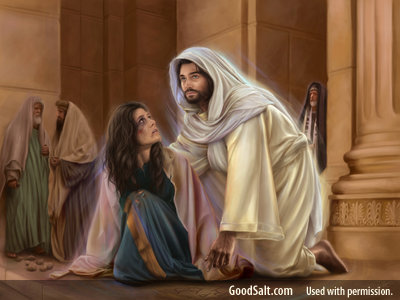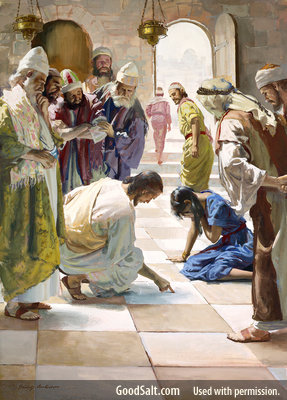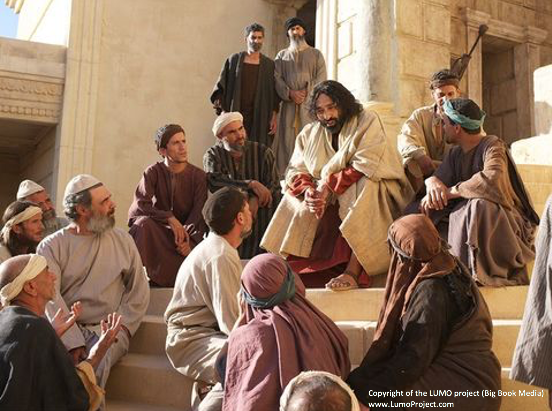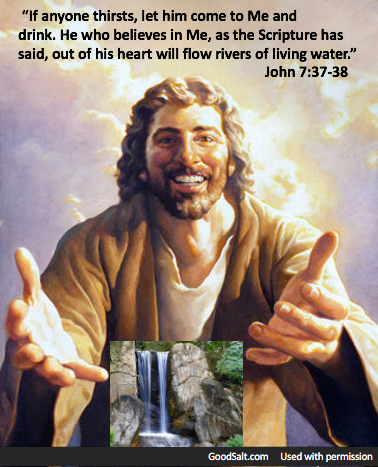“Then Jesus spoke to them again, saying, ‘I am the light of the world. He who follows Me shall not walk in darkness, but have the light of life.’ ” John 8:12
The setting of John 8:12 is back in chapter 7. It is the Feast of Tabernacles. One of the very special events during this feast was the “Illumination of the Temple.” This ceremony took place each evening in one of the courts of the Temple – the Court of the Women. In the center of this court four giant candelabra were set up (the many-branched candlesticks used by the Jews). Some accounts say that these golden candelabra were as high as seventy-five feet. At night, they were lit and they brought light to the whole temple area and most of Jerusalem. It was spectacular, and people would celebrate all night.
The reason they did this was to remember another wilderness experience. It was the pillar of fire. During the exodus from Egypt, God protected and guided the people of Israel through the wilderness with the pillar of fire. God was with them.
At the end of the feast, the lights were purposely put out. Why? Because the Messiah had not come yet.
It is in the same temple area where the lights were put out the night before that I believe Jesus says, “I am the light of the world.” (John 8:12a). It is as though Jesus is saying, “Do you remember the pillar of fire that came between the Israelites and the Egyptians near the Red Sea, the pillar that protected them and led them on their wanderings in the wilderness? That was My presence with them. I was God with them and I am God with you! It was I who protected them. It was I who guided them through the wilderness. I am the light of the WORLD – not just the light for the nation of Israel, but the light for the entire world. I offer hope to every one of every country, culture, and color.” What a statement! Jesus is claiming to be God.
The phrase “I Am” is how God identified Himself to Moses at the burning bush (Exodus 3:13-14). “I Am” is also how Jesus will continue to state His own identity to the people of Israel. Jesus has already stated, “I am the bread of life” (6:35). Later on, He will identify Himself with more “I am” statements: “I am the door” (10:9), “I am the Good Shepherd” (10:14), “I am the Resurrection and the Life” (11:25), “I am the Way, the Truth and the Life” (14:6), “I am the true Vine” (15:1). Each one of these staggering statements attested to the fact that He was and is God.
Because Jesus is God (cf. I John 5:20), there is no darkness or sin in Him. The Bible says, “This is the message which we have heard from Him and declare to you, that God is light and in Him is no darkness at all.” (I John 1:5; cf. 2 Corinthians 5:21; Hebrews 4:15). Since Jesus is “the light of the world,” He can offer hope and life to every person of every country, culture, and color. Christ does not favor one particular culture or color of people over another. He loves every person equally and longs to have a personal relationship with each one.
So much emphasis is placed upon the color of a person’s skin today which leads to much hatred toward those who look differently. This is not from the Lord (cf. I John 2:9-11). God created all people of all colors and we are to praise Him for this. The real problem in the world today is not skin, it is sin. All people of all colors have a problem called sin (Romans 3:23). This is why some people think they are superior to others. This is why some people allow their own prejudices to mistreat others. This is why there is racism in the world. Until we stop focusing on skin and start dealing with our sin, there will be no lasting reconciliation among the different cultures and colors of people in the world today.
God has provided the solution to our sin problem by giving His only begotten Son, Jesus Christ, as the Savior of the world (John 3:16a; 4:42). Christ loved us so much He died in our place on a cross to pay the full penalty for our sin, and three days later He rose from the dead and He is alive today (John 19:30; I Corinthians 15:3-6). Jesus invites us to believe or trust in Him alone for His gift of everlasting life. When we do, we become “sons of light.” Jesus said, “While you have the light, believe in the light, that you may become sons of light.” (John 12:36).
Notice that Christ says we can become “sons of light” simply by believing or trusting in Him alone for His gift of salvation. This verse does not say we become “sons of light” by going to church, being baptized, confessing our sins, praying five times a day, living a good life, or by keeping the sacraments. The only condition is to believe in the Light which is Jesus Christ.
After believing in Christ, we are no longer defined by our sin and shame. We are defined by the Light of Jesus Christ. The Bible says, “For you were once darkness, but now you are light in the Lord. Walk as children of light.” (Ephesians 5:8). How do we live as children of light?
Jesus explains, “He who follows Me shall not walk in darkness, but have the light of life.” (John 8:12b). This is such a wonderful promise. There is nothing we need more in this world than light on our path. Many people are walking in the darkness of sins today. They don’t know where they are going. They have no idea of what is ahead; they are running into disaster and they cannot even see it coming. But how does a person break loose from the bondage of sin? How can we come out of the domain of darkness and its influence into the domain of God and the influence of His light and purity? Simple. By following Jesus! “He who follows Me shall not walk in darkness, but have the light of life.” That tells me two things:
1. Jesus will never lead me into darkness. He will never lead me into sin. So if I will just follow Him like a sheep follows a shepherd, I will not find myself in darkness but in “light” (holiness and hope) and “life” (relationship with God). On the other hand…
2. If I am living in sin, if I am walking in darkness, I must not be following Jesus—because that’s not where He is going. I can never blame Jesus for my sinful lifestyle or hopelessness. Because He is the antithesis of both! If I am letting Him lead me, I will have holiness and hope in my life.
I have had those who are opposed to Christianity try to justify their rejection of Christ by referring to all the horrific things done in the name of Jesus Christ, such as The Crusades or the atrocities of Adolph Hitler. I assure them, that those who have done terrible things in the name of Jesus Christ are not representing biblical Christianity. When people murder or mistreat other people because of their different skin color or religion, they are not following the example of their Leader, Jesus Christ, Who taught us to love our neighbors and our enemies by blessing them, doing good to them, and praying for them (Matthew 5:44; Luke 10:27-37). Jesus Christ is not responsible for those who misuse His name to justify their own sinful choices. Those people will answer to Christ for the wrongs they have done.
Notice how positive the solution is in John 8:12. It is not that I fight off my horrible lust, prejudices, selfishness, and greed so I can follow Jesus. That would be impossible for me to do. But if I will choose to follow Christ and obey His Word, and continue in that choice no matter how imperfect or how weak I may feel my walk with Him is — that choice lived out day by day will take me where I need to go. Can you say with firm conviction, “I have decided to follow Jesus”? Peter didn’t follow Jesus perfectly, but he followed Him as a choice of life. James and John and the other disciples were slow learners like some of us are. But they were followers of Jesus and that journey led them out of darkness into light.
What the world needs today is the Light of the world, Jesus Christ. Only Jesus can transform the sinful human heart so that hatred is replaced with love. Until people find peace with God through faith in Jesus Christ alone (Romans 5:1), they will not be able to live peacefully with themselves or others (Ephesians 2:13-18). Governments and politicians cannot do this for us. Only Jesus Christ can and does when we come to Him on His terms.
I read a story about a grandfather who took his little grandson for a walk in the woods. As they were walking along they stopped for a moment and the grandfather asked, “Do you know where we are?” The little boy said, “No!” The grandfather asked, “Do you know where we’re going?” And the little boy again said, “No!” The grandfather chuckled and said, “Well, I guess you’re lost then.” The boy looked up at his grandfather and said, “No, I’m not lost. I’m with you.” When you are with Jesus, when you are following Him, you will never be lost and you will arrive where you need to be.
Prayer: Father God, as I look at the world today, I see people wandering in the darkness without any lasting hope. They don’t know where they are going. They have no idea of what is ahead; they are running into disaster and they cannot even see it coming. I was once one of those people. But when You removed the blinders from my mind, I was able to see the light of Jesus’ glory so I could believe in Him (2 Corinthians 4:4). And at that moment, You transferred me from the domain of darkness into the marvelous light of Your Son’s kingdom (Colossians 1:13; I Peter 2:9). I am no longer defined by my sin and shame, but by the Light of Jesus Christ (Ephesians 5:8). I now have a choice. I can choose to follow Jesus, the Light of the world, and no longer abide in the darkness of sin, or I can follow my own sinful flesh and the course of this world which leads to the darkness of sin, hate, and death (John 8:12; 12:35; I John 2:9-11; 3:11-15). Thank You, Lord Jesus, for never leading me into darkness when I follow You. Forgive me for the many times I have blamed You for my own sinful choices. How foolish I was to do such a thing! But even then, You did not stop loving me nor did You give up on me. You still loved me and patiently waited for me to turn back to You. Thank You so much for the hope I have when my eyes are fixed upon You. Please lead me to those who are abiding in darkness that I may share the Light of the world with them. In Jesus’ name. Amen.

